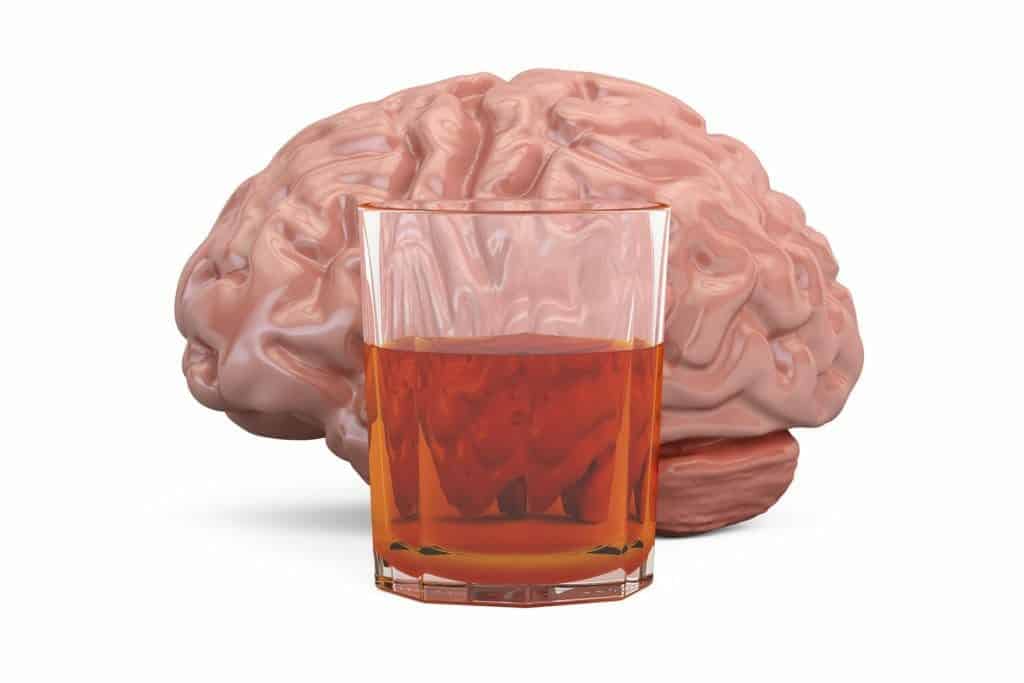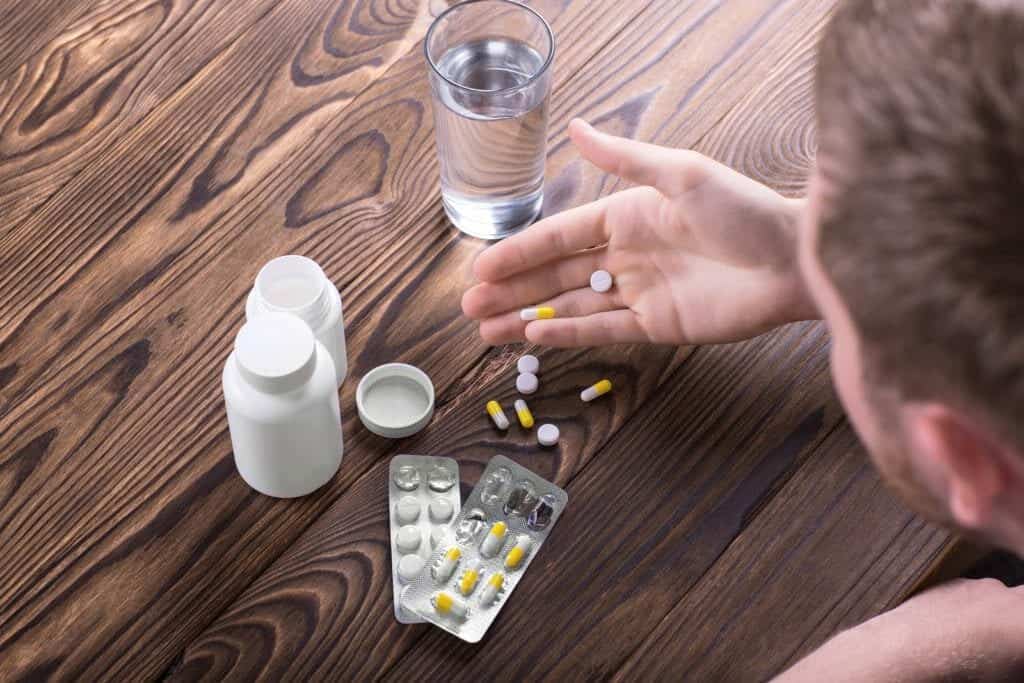According to the National Institutes of Health (NIH) 19.5% of alcoholics in the United States belong to a subtype known as “functional.” These individuals tend to be middle-aged and well-educated with stable jobs and families. About one-third have a multigenerational family history of alcoholism and about one-quarter have a depressive illness sometime in their lives. But what else do we know about these individuals? How do you spot a high-functioning alcoholic?
What Is a High-Functioning Alcoholic?
Despite the fact that high-functioning alcoholics share many of the same symptoms as traditional alcoholics, they are better at hiding the problem. Their lives seem to be in order (both personally and professionally), but in reality, they’re losing control. Their ability to function in society and at home impairs their judgement and many can’t accept or admit they have a problem. This means that high-functioning alcoholics rarely get the help they need as they actually start to need it.
So how can you tell if your loved one is an alcoholic? Here are 7 symptoms to look for:
- They start coming up with reasons or excuses to justify their heavy alcohol use.
- They set limitations for themselves but frequently surpass that limit.
- They lose interest in activities and stop socializing with friends when alcohol isn’t involved.
- They start replacing food or meals with alcohol, and start sneaking and hiding it from others.
- Their behaviors start to change and they become more aggressive or impulsive when they drink.
- They start frequently experiencing blackouts.
- They drink in the morning to avoid feeling hungover or experiencing withdrawal symptoms.
It’s only a matter of time before most of these high-functioning alcoholics break. And once a person loses control, it’s hard to get it back. Maybe your loved one has been lucky enough to avoid serious problems so far, but everyone’s luck runs out. Get them the help they need before that happens.
For more signs that your loved one might be an alcoholic, click here.
Meet A Cycles of Change Parent: Stella
“My husband and I owe our son’s recovery to the Cycles of Change Recovery program. He had been struggling for a long time before he asked for help. The program offered him the skills, motivation and self-esteem to stay sober and hopeful that he could create a healthy, wonderful new life for himself.”
Hear from more of our alumni and their families.
Closing
Facing addiction alone can be overwhelming. Cycles of Change Recovery Services is here to help. We offer a variety of alcohol treatment programs and our counselors will work with your loved one to help them choose the best program to support their goal of sober living. Fill out this form or call us today at (661) 630-4176 for more information.
If you’ve ever drank alcohol or watched someone you know indulge, it’s pretty clear that it can significantly affect the brain. After even just a few drinks, it’s possible for people to have difficulty walking, slurred speech, slow reaction times and blurred vision. Side effects like these often correct themselves once drinking stops. But what happens to your body (and your brain) when you drink heavily over a long period of time?
When does drinking become a problem?
Addiction and Your Brain
Drugs and alcohol chemically alter the brain’s structure, and it doesn’t take long for it to respond to the presence of addictive substances. How does it all work? Certain activities (basically anything that makes us feel good or happy) cause a chemical called dopamine to be released in the brain.
A supercharged rush of dopamine is released to the brain through the use of drugs and alcohol. Your brain remembers this euphoric feeling, and can actually rewire itself into classifying these substances as something it needs. The more you drink, the more dependent you and your brain become on alcohol to function.
Factors That Influence Alcohol’s Impact
There are a number of factors that influence how (and to what extent) alcohol affects the brain. These include:
- How much a person drinks
- How often a person drinks
- How long a person has been drinking
- A person’s age, level of education and gender
- A person’s family history of alcoholism
- A person’s general health status
Effects of Alcohol
Even moderate amounts of drinking can impact your brain. But the more you drink (volume and frequency) the more serious the side effects become. Consider the following long-term side effects of alcohol on the brain.
- Anxiety
- Depression
- Paranoia
- Blackouts and memory loss
- Thiamine deficiency (among other chronic vitamin deficiencies)
- Development of Wernicke–Korsakoff Syndrome
- Hepatic encephalopathy (brought about by prolonged liver dysfunction)
- Cognitive impairment (slow processing of information, difficulty in learning new things and reduced problem-solving ability)
- Wasting away of brain tissue
- Scar tissue in the brain
- Impaired balance and coordination
Although it is possible for some of the heaviest drinkers to develop irreversible brain-damage syndromes, most of the side effects associated with alcohol consumption can be improved upon or eliminated. Depending on the severity of the addiction among other factors, once alcohol consumption stops, healing can start to take place (few weeks to a year).
Meet Margi
“Cycles of Change was my third rehab after a life long struggle with alcohol dependence. There I found a staff that was caring and attentive. The program was structured to include all aspects of recovery, not only my addiction but my spirit and body. I learned more here about the disease and about myself than I had anywhere else. I am going on three years of being clean and sober and my son is also an alumni with almost two years clean. If you are tired of being tired, if you are ready for a sober life I highly recommend Cycles of Change, they saved both my son’s and my life.”
Hear more from our alumni!
Worth the Work
Alcoholism, like other addictions, is a disease. It’s not a choice you made and it’s not a reflection of who you are. If you’ve done the hard part and come to terms with the fact that you are dependent on alcohol, it’s time to pursue the help you need.
Facing your addiction alone can be overwhelming, but Cycles of Change Recovery Services is here to help. We offer a variety of alcohol treatment programs and our counselors will work with you to help you choose the best program to support your goal of sober living. Fill out this form or call us today at (661) 630-4176 for more information.
Heroin is a highly-addictive drug. People who regularly use heroin can quickly develop a tolerance and this puts them at increased risk for an overdose. They’re also likely to experience a variety of long-term side effects. These include:
- Liver disease
- Lung-related complications
- Collapsed veins
- Infection of heart lining
- Infection of heart valves
But how does heroin affect the brain specifically? Let’s take a look.
Wondering if someone you love is using heroin? Know what signs to look for.
Heroin Addiction and Your Brain
It doesn’t take long for your brain to become dependent on heroin. The minute it enters your system, your body almost immediately converts the drug into morphine. This morphine binds to opioid receptors in the brain, and that’s when intense feelings of well-being, painlessness and extreme relaxation set in.
These euphoric feelings are unlike anything you experience naturally. Your body’s dopamine levels reach heights far beyond normal, and just like that your brain begins to change. You lose interest in things that traditionally brought you joy and begin to search for that next fix. Your primary goal is to recreate that same sense of pleasure and relief.
Side Effects of Heroin on Your Brain
Beyond addiction, there are many other long-term side effects that prolonged heroin use has on the brain. Consider the following:
- Changes in the physical structure and physiology of the brain. This creates long-term imbalances in neuronal and hormonal systems (that are not easily reversed).
- Deterioration of the brain’s white matter. This may affect a person’s decision-making abilities, their ability to regulate their behavior, and how they respond to stressful situations.
- Clogging of blood vessels in the brain. Some heroin contains additives that do not easily dilute in the bloodstream.
- Decrease in how much opium, dopamine and serotonin (among other neurotransmitters) the brain produces. Heroin releases these substances artificially, so the brain is less likely to create its own.
- Depressed breathing. Individuals who abuse heroin will likely experience shallow or irregular breathing. As a result, the body (including the brain) receives less oxygen which can lead to organ damage. This can also lead to brain injuries that can cause coma, seizures and even brain death.
Meet Todd
“I’ve been sober for 17 months now. My drug of choice was heroin. Actually, when I first got to Cycles of Change…it was at the point in my life where everything was going downhill. Once I got there, I had the opportunity to embrace the family figures as far as the people who had true care and concern for an individual who was hopeless at that moment…They allowed me to see that I had the opportunity to change my life around.”
Hear Todd’s full story and watch his testimonial!
You Can Succeed (And We Can Help)
Heroin is an incredibly powerful and addictive drug. And it can be easy to lose yourself in the struggle. But it’s never too late to get the help you need. Cycles of Change Recovery Services is California’s premier heroin rehab treatment center. Our individualized treatment programs are designed to help you gain the knowledge, courage and determination you need to live a happy and productive life. Heroin addiction recovery isn’t an easy journey, but at Cycles of Change we make the process as comfortable as possible. Give us a call today: (661) 630-4176.
Watching someone you love struggle with heroin addiction can be incredibly painful. It’s important to remember that addiction is a powerful disease. And that the only way to help your loved one overcome their addiction is to get them the help they need. Don’t know where to start? You’re not alone. Choosing the right heroin rehab center is the first step.
Cycles of Change Recovery Services is California’s premier heroin rehab treatment center. Located in Palmdale, our individualized treatment programs are designed to help individuals gain the knowledge, courage and determination needed to live a happy and productive life. Heroin addiction recovery isn’t an easy journey, but at Cycles of Change we make the process as comfortable as possible. Alumni will leave our heroin addiction programs with the skills they need to thrive.
Wondering if your loved one is using heroin? Learn the warning signs.
Questions to Ask Your Heroin Rehab Center
1. IS MY LOVED ONE IN GOOD HANDS?
Behind every successful rehab program is a qualified team. Our drug rehab staff is dedicated to your loved one’s success and recovery. The team is made up of licensed clinical psychologists, family therapists, a medical staff and other industry professionals fully invested in your loved one’s journey to life-long sobriety.
We understand that heroin addiction is complex but treatable, and are involved in the recovery process from beginning to end. We work with individuals to develop customized treatment plans designed to address their specific needs.
2. HOW CAN I TRUST MY LOVED ONE WILL GET THE SUPPORT AND HELP THEY REALLY NEED?
There’s no such thing as a one-size-fits-all solution when it comes to rehab programs. We know that and offer a continuum of care to address your loved one’s unique needs:
- Addiction detox: Drug addiction detox is a necessary step in the recovery process. Our qualified, experienced and compassionate treatment team is here to ensure you move through your program safely, with the least amount of physical discomfort.
- Residential treatment: Our residential treatment center offers individuals a comfortable home where they can escape the stress of everyday life and focus on getting healthy (inside and out).
- Outpatient programs: Our partial hospitalization program is a long-term outpatient program that provides individuals with the opportunity to begin adjusting to life outside of the treatment center. They’ll go home each night and return each day to receive the full support of our counselors and the benefits of our recovery programs.
- Sober living program: Even with relapse tools on hand, temptation in the early days of sobriety can remain strong. We offer a sober living home for individuals who find themselves in this situation. It’s a way for those who have completed rehab to transition into everyday life through structure and support in a comfortable setting.
3. WHAT PROGRAMS DO YOU OFFER BEYOND TRADITIONAL REHAB TREATMENT?
Cycles of Change understands the importance of offering a variety of programs to help individuals overcome their addictions in a safe and secure environment. In addition to the more traditional heroin rehab treatments, we offer:
- Meditation and yoga: Meditation and yoga therapy help during the changes your loved one will experience in rehab. Later the skills learned here will be effective in reducing stress, relapse prevention and maintaining a healthy lifestyle.
- Psychodrama: Often psychodrama therapy reveals areas of distress that a person has been feeling, but was never able to talk about or admit were contributing to their addiction.
- Biosound therapy: These affirmation exercises are positive, stimulating, and an extremely effective means of motivating and empowering our clients to become aware and mindful of the present moment.
Recovery Toolkit
Your loved one will also have access to:
- Nutritional and medical management (including medication management)
- Rehab counseling
- Interactive family programs
- Assessment of medical and psychiatric requirements
- 24/7 on-site medical help and supervision
- Interpersonal relationship development
- Addiction education (how to prevent relapse)
- After care programs and counseling
Even after rehab is complete, they’ll be provided with a support group, regular fellowship meetings and wellness resources to promote healthy habits.
Meet Stella
“My husband and I owe our son’s recovery to the Cycles of Change Recovery program. He had been struggling for a long time before he asked for help. The program offered him the skills, motivation and self-esteem to stay sober and hopeful that he could create a healthy, wonderful new life for himself…They saved my son’s life and for that I will always be grateful.”
– Stella –
Hear more from our alumni’s families!
Admission to Our Heroin Rehab Facility
The health and well-being of your loved one are too important to wait another minute. Is today the day you help your family member or friend regain control of their life? It only takes one phone call to begin the process of recovery: (661) 630-4176.
As we’ve mentioned in previous blogs, people tend to consider painkillers inherently “safe” drugs because when used properly, they’re legal. But even when taken exactly as prescribed, it’s easy to become dependent on opioids.
If you find yourself physically dependent on pain pills even though you’ve followed your doctor’s orders and done everything right, you might be able to stop taking pain pills on your own.
To learn more about how painkiller use can affect your physical health, click here.
“Almost no one starts taking prescription painkillers thinking that they’ll be taking them indefinitely. They just know they’re hurting and they want relief.” – Mark Sullivan, M.D. (Professor at the University of Washington in Seattle)
Knowing When It’s Time to Stop Taking Pain Pills
How do you know when it’s time to stop taking pain pills and start looking for alternative ways to deal with your pain? Ask yourself these questions:
- Have I been taking pain medication for a month (or more)? Pain pills are typically prescribed to treat short-term pain from surgery or an injury. It’s very rare that doctors recommend taking such drugs for longer than a month.
- Do I feel better? If you have been prescribed pain medication to manage long-term pain, your pain levels and function will likely be evaluated every few months. If these medications are only marginally helping (or if your condition actually worsens) it’s probably time to try something new.
- Do I take high doses of my pain pills? The higher the dose of medication you take, the higher the risk of experiencing serious side effects and addiction.
- Are the side effects worth it? Common side effects of pain pills include nausea, abdominal pain, constipation, drowsiness, sexual dysfunction and bone loss.
It’s Important to Do It Right
So, you’ve decided you’re ready to try and stop taking pain pills on your own. Before you begin this journey, it’s highly recommended that you meet with your doctor and come up with a plan together. It will likely look something like this:
- Increase time between doses. This is the recommended approach for short-acting medication. Start by cutting back on the frequency (how often you take a dose), then decrease the dose itself (how many pills you take). Continue to decrease your dosage over the course of about a week, then try stopping all together.
- Slowly reduce the dose you’re taking. This is the best approach for long-acting medication. Increase the number of hours in between doses over the course of a few weeks. When you’re down to once a day, try stopping. (NOTE: never cut, crush or chew long-acting medications).
Everyone’s recovery plan will look a little different, so again, work with your doctor on the best approach for you.
Managing Withdrawal Symptoms on Your Own
The addictive nature of opioid pain pills increases the likelihood that you’ll experience some withdrawal symptoms when you decide to stop taking them (even if you go about it the right way). The following tips can help you feel better:
- Take a multi-vitamin
- Eat a well-balanced diet
- Stay hydrated and drink lots of water
- Soothe your muscle aches by taking a hot shower or getting a massage
- Get lots of sleep
- Increase your exercise levels
If You Can’t Do It Alone, We’re Here to Help
If you think you’re addicted to pain pills and want to stop taking them, you might need some additional help. That’s where we come in. Our addiction recovery center in California is designed to help you gain the knowledge, courage, and determination you need to maintain a drug-free lifestyle so you can flourish as a productive and functioning member of your family and society. From day one each step and treatment program will be created around you and your individual needs to ensure you reach your goal of recovery. Fill out this form or call today at (661) 630-4176.






